Keira Knightly Deconstructs Her Smile
Reflections on some Christmas movies after a year in which love has NOT been all around.
I really like Keira Knightley in “Black Doves.” She’s always been a good actress, but although she’s been in movies like “Atonement” and “Pride and Prejudice” in which she was not allowed to dazzle too much, those performances never displaced, in my mind, the radiant bride of “Love Actually.” Keira has one of those smiles that, when put into action, takes over her face and (as the cliche goes) “lights up a room.” The fetching pixie-charm element is so overwhelming that it’s hard to believe she isn’t forcing it. And for someone who aspires to be taken seriously as an actress, that isn’t such a good thing.
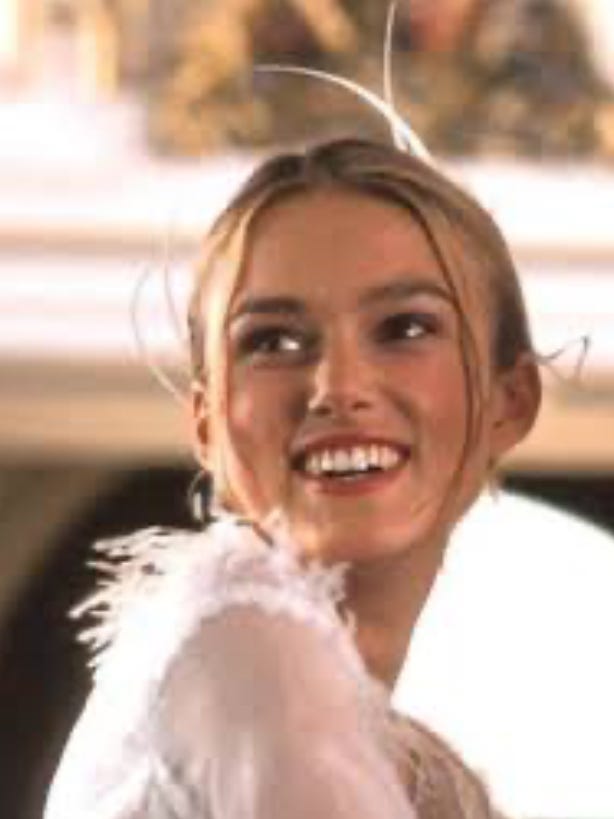

But now she’s in a role in which that smile is supposed to be deliberately turned on, is meant to be a public-facing artifice disguising a secret self behind. She’s finally looking older, too, and it makes her role as a brainy spy seamlessly believable in a way that the permanently pretty-baby-faced Keri Russell hasn’t been able to achieve playing a diplomat. It doesn’t matter how confident Russell’s stride is or how many orders she barks, she always looks like Felicity to me.
Near the beginning of the first episode of “Black Doves,” Helen (Keira’s character) slips out of a Christmas party and meets with her boss Mrs. Reed (the phenomenal Sarah Lancashire), who tells her that her lover Jason (Andrew Koji) has been murdered. Helen keeps her composure; it’s her superpower, and a necessary one in her position. For most of the world, she’s the proper wife of a rising politician and the devoted mother of twins who makes ornaments for the Christmas play. In her secret life she’s a top “Black Doves” spy with a “coiled fist,” razor-sharp mental “craft,” and excellent fighting skills. That’s the Helen who meets with Reed and she’s almost not beautiful. But soon it’s time to return to the party and the switch is flipped. There she is, Keira in all her dazzle.
On “Morning Joe,” she describes how she did it:
Helen’s best friend, the triggerman Sam (Ben Whishaw, an inimitably compelling actor, looking in “Black Doves” both manly and feline) also has a secret life. It’s his warm heart, which keeps getting him in trouble, even after he’s passed the test of killing his own father. His secret warm heart draws him to Michael (Omari Douglas), an artist whose tender sweetness blots out the “not nice things” that invade Sam when he closes his eyes. Michael, for Sam, is the embodiment of goodness and hope in a life filled with blood and violence, and the scenes of their relatively brief time living together show a Sam whose entire soul has expanded. He smiles broadly—not a common occurrence for Sam, who usually seems to be perpetually working hard, especially around the mouth, to keep his face from showing any emotion. But he’s actually a man with strong feelings for others who was, unfortunately, raised by a rarely present but psychically powerful hit-man father. Whenever Sam smells “gun oil, leather, nicotine, rust, it's like... like he's back.” (Helen jokes: “Right. Proust's shotgun.”)
Although he’s in the family business, Sam doesn’t enjoy killing, and I was surprised when a commenter on my Facebook page described “Black Doves” as “six hours of British psychopaths” without one sympathetic character. I disagree on all counts except for the “British” part.
Two of the characters are arguably psychopaths—the freelance assassins Eleanor (Gabrielle Creevy) and Williams (Ella Lily Hyland). They kill without qualms or conscience and seem to have fun in the process (“Right, let’s all have a double gin and tonic and go do some fucking murders, then, is it, yeah?”) Unlike Sam (or Sam’s father and even mob-boss Lenny), they don’t try to live by a “code” that allows them to imagine some killings are morally ok. They don’t lie awake at night wrestling with concern over the consequences of their actions.
But unlike the prototypical fictional psychopath they aren’t emotionally vacant (think Anton from “No Country for Old Men”) or manipulative of other people’s emotions (think Hannibal Lector.) They aren’t sadists who relish the pain of others. And they’re weird and funny and at times, unexpectedly vulnerable. For all the blood and guts they blast out of other people, they are, believe it or not, the comic relief of the movie. Of course, they are extremely dangerous. But the danger doesn’t come from some internal pressure to savage other people. They’re killers for hire, and it’s hard to know how much of their casual attitude toward killing is the product of learning how to do their job well and how much reflects what Eleanor describes as her “preternatural inclination to violence.” Williams wonders about that too. When Sam asks her if she thinks she might be a psychopath, she answers “Yeah, it's possible, I suppose.” She’s also adamant that Sam is not one. “Psychopaths don't stand outside their ex-boyfriend's flat, pining like a slapped dog,” she says.
Although Sam adores Michael and Helen is both married and has a lover (killed at the beginning of the movie), it’s my argument that their relationship with each other—which began when Helen was a novice Black Dove and Sam entrusted to teach her the craft of his game—is the central love story of “Black Doves.” Only with each other can they be fully themselves. They share not only a chosen life of danger and the strain of a divided existence, but a sardonic sense of humor and pleasure in being together. They squabble like a married couple. He calls her “darling” and gets jealous when her relationship with Wallace, the politician she eventually marries, starts to take up most of her time. (Yes he’s gay, but that doesn’t mean he can’t have a crush on a woman. That’s among the charms of “Black Dove”; I challenge you to name another straight woman/gay man movie or tv relationship that doesn’t keep the characters in neat sexual boxes.) And each one is ready to—and does—risk their life for the other, with profound results.
You can call “Black Doves,” as Keira Knightly does, a “buddy movie” (wrapped around a murder mystery which is itself wrapped around a spy thriller.) Or you can call it love. “Some people are... magnets,” Sam’s friend says, “They just zoom, zoom, zoom towards each other. You can't do anything about it.” He’s talking about Michael and Sam. But it’s also true of Sam and Helen, in a way that hasn’t been captured with as much ease, as few cliches, or as many layers, in other depictions of straight woman/gay man friendships.
The same can’t be said of Helen’s relationship with Jason, her murdered lover. Helen imagines herself to be in with her Jason. I say “imagines” because although Helen feels something deep and driving that she names “love” we don’t really get taken beyond the word.
The dialogue between Helen and Mrs. Reed, in which Helen “describes” her relationship with Jason is very minimalist:
Reed: How long?
Helen: Three months.
Reed: Why? Did you need a contact in the Justice Department? Were you trying to work an angle?
Helen: I wasn't working an angle. It was real. It wasn't a job. It was...
Reed: It was what?
Helen: Love.
Reed: Oh Christ.
Is it love? Who knows what she means or he means when they say that word. She spends the whole movie trying to find and kill the person who ordered Jason’s murder, and we’re given some gauzy scenes of sexual and romantic movie intimacy that we’ve seen in some form or another hundreds of times. But unlike the flashbacks of Sam’s relationship with Michael or Helen, they look…well, like they’re playing being lovers in a movie. Canned. Cliched. Reed’s “Oh Christ” seems on target to me.
Black Doves” seems to have become a sort of touchstone for me this year. I decided to re-watch “The Holiday” because Sam, tied up along with girl assassin Eleanor and the Chinese Ambassador’s daughter Kai-Ming (Isabella Wei) says it’s his favorite Christmas movie. (Eleanor says it’s a “shit movie” but her favorite is “The Santa Clause,” so…) The talk about Christmas movies doesn’t figure in the movie other than as the sort of banal, darkly comic conversation among killers that “Pulp Fiction” first introduced into popular culture (“the joke being that despite the extreme nature of their work, they move and react in the same ways that boring old regular people would”) but it started a little trail of Christmas movies for me to have another look at.
First was “The Holiday,” which I’d seen perhaps 15 times. Then, with great effort and dedication to my job, I got through “The Santa Clause” for the first time. Then, inevitably, “Love Actually”—inevitable not just because Keira Knightly is in both movies or because writer/director Joe Barton admits to having “a real soft spot for ‘Love Actually,’” but because as I view “Black Doves” (and have described it earlier) “Black Doves” is itself—actually—about love. And then, because it’s Keira Knightly‘s favorite Christmas movie (and one of mine as well), Edward and I watched “Die Hard.”
Of all these, “Die Hard,” which I once would have ranked below “Love Actually” and “The Holiday” stood up the best. Bruce Willis’s combination of vulnerability, old-fashioned male heroics, goofiness, and even a bit of feminist consciousness (barefoot and bleeding, he realizes he should have supported his wife—Bonnie Bedelia—in her fancy new job) is a genuinely disarming version of non-toxic action macho. And Alan Rickman!—the Platonic Form of sneering, “civilized” evil. It still works (I fell asleep during “Die Hard 2,” though.1
This year, I found it impossible to watch any of the other two (no review of “The Santa Clause”, sorry) with the wholehearted pleasure I’d once felt.
The Graham (Jude Law)/Amanda (Cameron Diaz) romance in “The Holiday” roused in me in a foul combination of unwillingness to suspend disbelief and pure envy. At the beginning, all I could think about was how ridiculously gorgeous Cameron Diaz was, how much I wanted her white sweater with the little buttons on the sleeves, and how did that dog get fed and walked before she arrived at the cottage? Speaking of which: Could director/writer Nancy Meyers, queen of the lust-inspiring kitchen in other movies, have come up with a less adorable, snow-covered cottage for Cameron to stay in? And is there any universe in which she and Jude Law weren’t going to have sex?
You get my mood here. There is one very sweet scene in which Amanda gets into a little girl’s fantasy-tent with Graham’s daughters and they tell her, in charming British-child accents, how much they like her eyeshadow and lipstick—that seemed exactly how little girls would respond, and it charmed me. But really, the little daughters are mostly accessories, along with Graham’s being a “man who cries more than any woman” (“A good book, a great film, the opera... I more than cry. I weep. I'm a major weeper. It's pathetic, is what it is.”) to enhance Graham’s McWonderfulness. A widowed book editor with two precious children—and he weeps and looks like Jude Law. Come on.
Meyers gave ordinary, non-gorgeous men something too. I think of it as the Woody Allen fantasy. Unless we (women, that is) are slender, young, and beautiful, no Jude Laws for us. But somehow we’re meant to accept that a Kate Winslett (so, so lovely) and a Jack Black (face it, very funny-looking) make an appropriate movie-couple. The idea is that he’s got all these other qualities—he’s talented, he’s a good listener, he’s smart and funny, etc.—which of course everyone wants to be loved for and should be loved for—but only men are. In the movies, anyway. And it’s pretty lopsided in “real life,” too.
I’m not saying “The Holiday” doesn’t still have its winning moments for me. I loved Iris’s (Winslett) rambunctious delight at waking up in a huge, plush bed in a huge Hollywood mansion. Her conversations with Arnold (Eli Wallach), a ninety-something screenwriter who introduces her to Irene Dunne and other feisty Hollywood heroines and convinces her she’s one of them rather than the dishrag she’s been playing to her narcissistic ex-boyfriend (Rufus Sewell), are charming. And there’s even a little gesture to Hanukkah. Maybe Eli Wallach, Jack Black, and director Nancy Meyers (and probably all the old actors at the table, too) remembered—for a minute—that even though this is a “Christmas movie” they’re all actually Jewish. (I guess it’s the last night, because all the candles are lit.)2
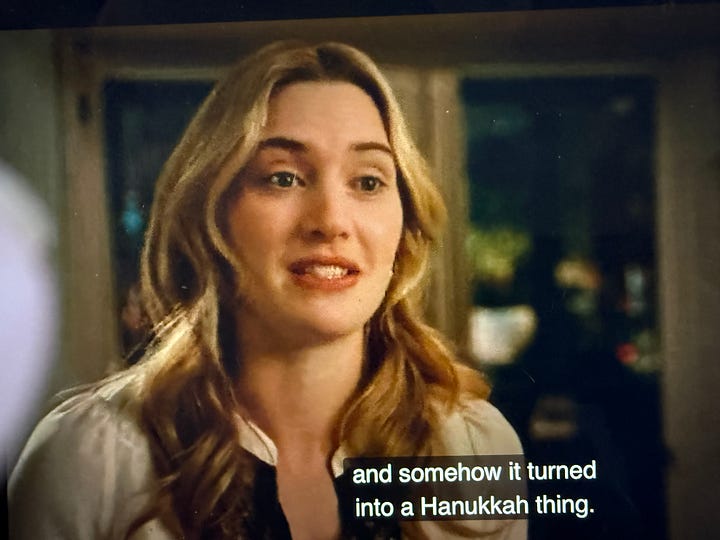
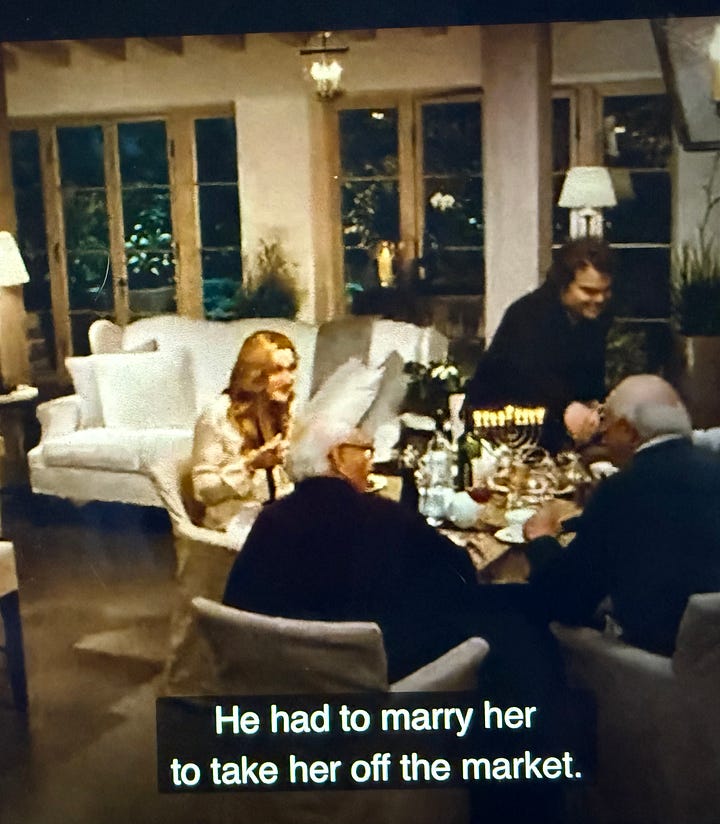
Watching “Love Actually” again was distressing, because I once would have ranked it number one and now it was like having arranged a date with an ex-lover, gotten all dressed up, excitedly waiting for him to show, and then when he does…you’re trying to think of an exit strategy to get you out of the restaurant.
In an interview, Joe Barton was asked why “Love Actually” wasn’t named by one of the characters in that favorite-Christmas-movie scene. He said he’d definitely thought of it, but decided it would be “too meta.” I don’t know for sure what he had in mind in saying that, but I’m taken with the idea that he was saying that, in a sense, “Black Doves” is a commentary on—I’d even say a deconstruction of— the hope, the optimism, the belief that because “love is all around” “everything’s gonna be all right in the end” that is the ground zero of “Love Actually.”
In 2024, we know that isn’t true. Our tolerance for deceptive surfaces and advertisements featuring deliriously happy families opening presents have worn down and for many of us, expired. “Suspending disbelief” over contrived happy endings is no longer a moment of giving oneself over to emotionally pleasing fictional worlds. Disbelief is both everyday shock and survival mechanism. We can’t always be fully absorbing the cruelty and greed and insanity. We have to escape sometimes, we have to pretend. But at the same time, the pretense at normalcy makes us feel insane, because we know it’s based on a lie. Many lies, actually. A universe of lies.
Those opening and closing shots of airport greetings and huggings still got to me. But then, any time that Beach Boys song is played—even through the credits of “Big Love”—I’m near tears. But then there is also: leaving your relatives the moment you’ve arrived and flying right back again across oceans desperate to declare yourself to a woman you’ve never had an actual conversation with (apparently he fell in love with her butt tattoo) (I do still love “I hate Uncle Jamie,” though); there’s the unrequited yearning for your best friend’s wife that has you show up at her door with flashcards (since it’s become an iconic, endlessly co-opted moment, it’s no longer very, um, fresh); there’s the British Prime Minister going door to door in a “dodgy” neighborhood looking for the “chubby” (what???) assistant he fell in love with at first sight (even director Richard Curtis regrets his profligate use of fat-shaming words, both in this movie and “Bridget Jones’ Diary”) There’s knowing how many hundreds, perhaps thousands, of couples have tried to replicate the wedding of those two impossibly beautiful actors. Etc. Etc
.
Because the fantasies of “Love Actually” were performed by terrific actors speaking some very clever dialogue, interspersed with some over-the-top wackiness (after attending the premiere with Emma Thomson, Hugh Grant asked her “Was that not the most psychotic thing we’ve ever been in?”), and one genuinely heartbreaking moment—you all know the scene I mean—many of us watched it over and over for years after year, charmed, laughing, weeping. I’ve been among them.
It seems, though, that it isn’t wearing very well in 2024. Out of 65 commenters on my Facebook pages, 55 said they hated it. Not just indifferent or bored. But hated. The farfetched contrivances of so much of the plot lines. The fat-shaming that somehow even I—who’d written a book about such things!—had missed. The sentimentality. The quite misogynistic portrait of the seductive secretary who embodies every nasty sexual temptress archetype in the book. (She actually spreads her legs at the desk outside his office; “It’s all for you, Sir.”) And that episode with the arrogant, groping American POTUS. It’s hard to respond to that as just a fictional mechanism for giving the British Prime Minister a motive to show some gumption. We know that guy, he’s not even as good-looking as Billy Bob Thornton, and he’s never been made to pay. “Love Actually” in 2024 manages to be both totally synthetic and all-too-real at the same time.
********
It’s not entirely the fault of the movie, it’s non-wokeness, or the over-use of its tropes. Everyone’s heart has been broken at one time or another and they’ve had to gather up their battered emotions, go into the next room, and smile for those who are counting on you. Emma Thompson does it so brilliantly, so intuitively perfectly—it’s the one scene from “Love Actually” that will never stop feeling true. But in 2024, something has been shattered that makes even a pretend smile a huge effort.
A few nights ago I was watching “Black Doves” for maybe the third time on my iPad while Edward graded final papers in the chair next to mine. MSNBC was on the big tv, sound low, reporting on Elon Musk’s twitter threats to primary any house members who voted “yes” to the bipartisan budget bill which had been negotiated and agreed to by the congressional leaders of both Democratic and Republican parties. And this scene was playing on my iPad. In it, Lenny (Kathryn Hunter), who manages triggermen in the world of British assassins, has come to extract a debt Sam owes her for his failure to kill the youngest member of the gang she’d hired Sam to bump off (it’s that damn warm heart; he just can’t kill a child.)
It was creepy to watch this scene while in the background our no-less bizarro mob boss issued threats to congress. It was like a dissolving of the wall between fiction and our increasingly surreal reality. The re-election of Trump was shocking, deeply disheartening, disorienting. Another four years? How would we possibly make it through? And then he began to surround himself with a cast of inept, possibly sociopathic weirdos who belong in an entirely different movie than the “creating an administration” one we were thought we were going to be watching. Star Wars mutants? The Joker’s henchmen? And now this truly strange, cocky little prancing person seemed to be taking over and issuing orders? And the broadcasters were still reporting on it all as though we hadn’t entered an alternative universe. Have you noticed, Katy Tur, that we’re not in “The West Wing,” anymore?
So those are my reflections on “Christmas movies” this morning. Later today, it will become Christmas Eve/First Night of Hanukkah. Very odd; hasn’t happened in four decades, and seems like another sign of the times being out of joint.3 Do you eat brisket or ham? Since I made a brisket not so long ago, I’ve decided on ham. But it feels a bit traitorous.
I’m looking forward to my daughter’s face as she opens her first present and lights the first candle.
However you mark the occasion, have a warm and lovely evening.
Susan.
There’s an entertaining episode on “Die Hard” in the “Movies that Made Us” series on Netflix that tells the history of how Willis got chosen, how the screenplay went through various permutations, etc. (https://www.imdb.com/title/tt10716940/?ref_=ext_shr_lnk)
I have to mention here my irritation that this year, for the first time in 40 years, the first night of Hanukkah is Christmas Eve. It feels as though Christmas is swallowing Hanukkah up, which it always does in the malls and movies, but at least has been the star of the show in my house for a few days, often all eight, as long as we’ve been celebrating both (that would be since our daughter was a toddler.) Jewish families that only celebrate Hanukkah may feel it’s no big deal to share with Christmas Eve but for me, especially after a fiercely anti-Semitic year, it seems symbolic of something dark and terrifying that we’ve been reminded of so often this year: the sense that an awful lot of people wish that we—the Jewish people—would just get lost. So I appreciated that menorah in “The Holiday,” even if it was such a sidebar.
See endnote 2 above.

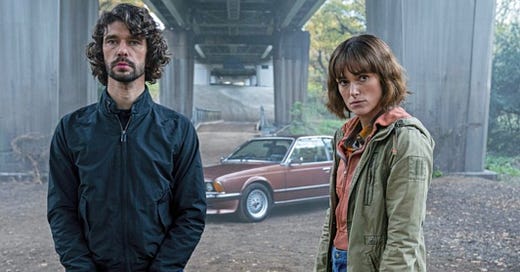


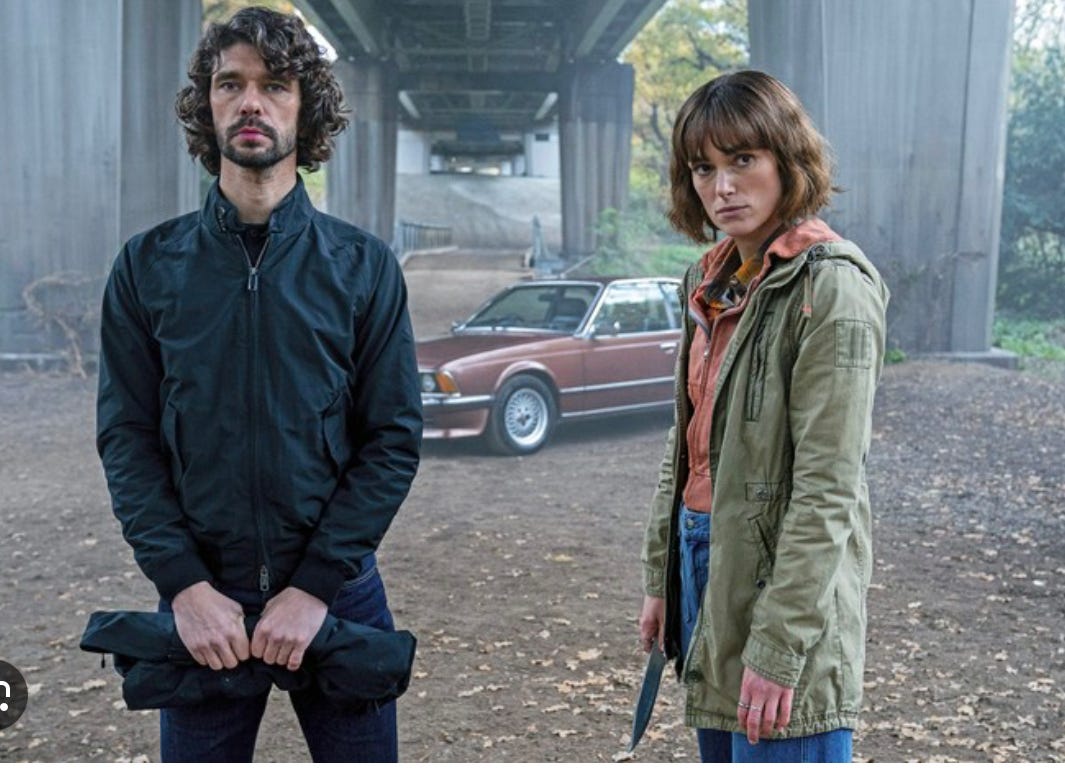

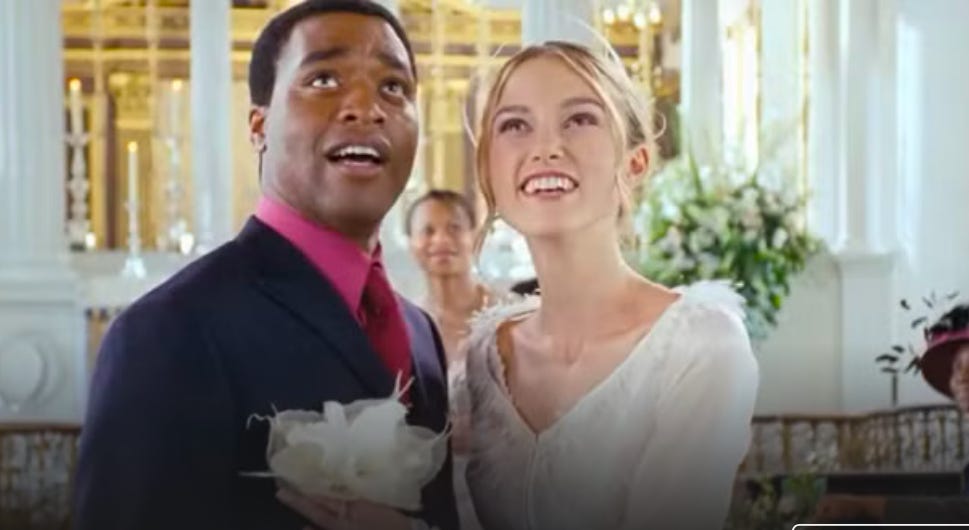
Susan,
I thought Black Doves was terrific. All the killing was softened by the sardonic humor. And Keira Knightly was human looking and acting! I thought Lenny stole every scene she was in.
The Diplomat has become background for me while we watch it.
I loved your description of Love e Actually as a disappointing reunion with an ex-lover.
My antidote to the overwhelm of Hanukah is to listen to Adam Sandler's Hanukah song.
I first saw Love Actually in theaters at age 16 with my mom and sister, and we still watch that scene with Emma Thompson and cry every single year 21 years later. It’s so heartbreakingly sad. And Keira Knightley’s smile really is radiant in that movie- we loved her in Pride and Prejudice but she was supposed to be somewhat plain to be Elizabeth so I understand why she wasn’t allowed to be as “beautiful.”
My husband loves Die Hard at Christmas, and I like Die Hard 1 and 2 actually- it’s goofy enough that it doesn’t feel as much like a normal action movie, and I love Bonnie Bedelia (Parenthood is a show I’ve watched over and over).
Maybe the fact that Keri Russell still looks so similar to Felicity is why I can’t get into The Americans- it just didn’t feel believable for me (I loved Felicity in middle school and used to watch it on syndication in college and on Hulu once that became a thing- Felicity holds up pretty well actually!)